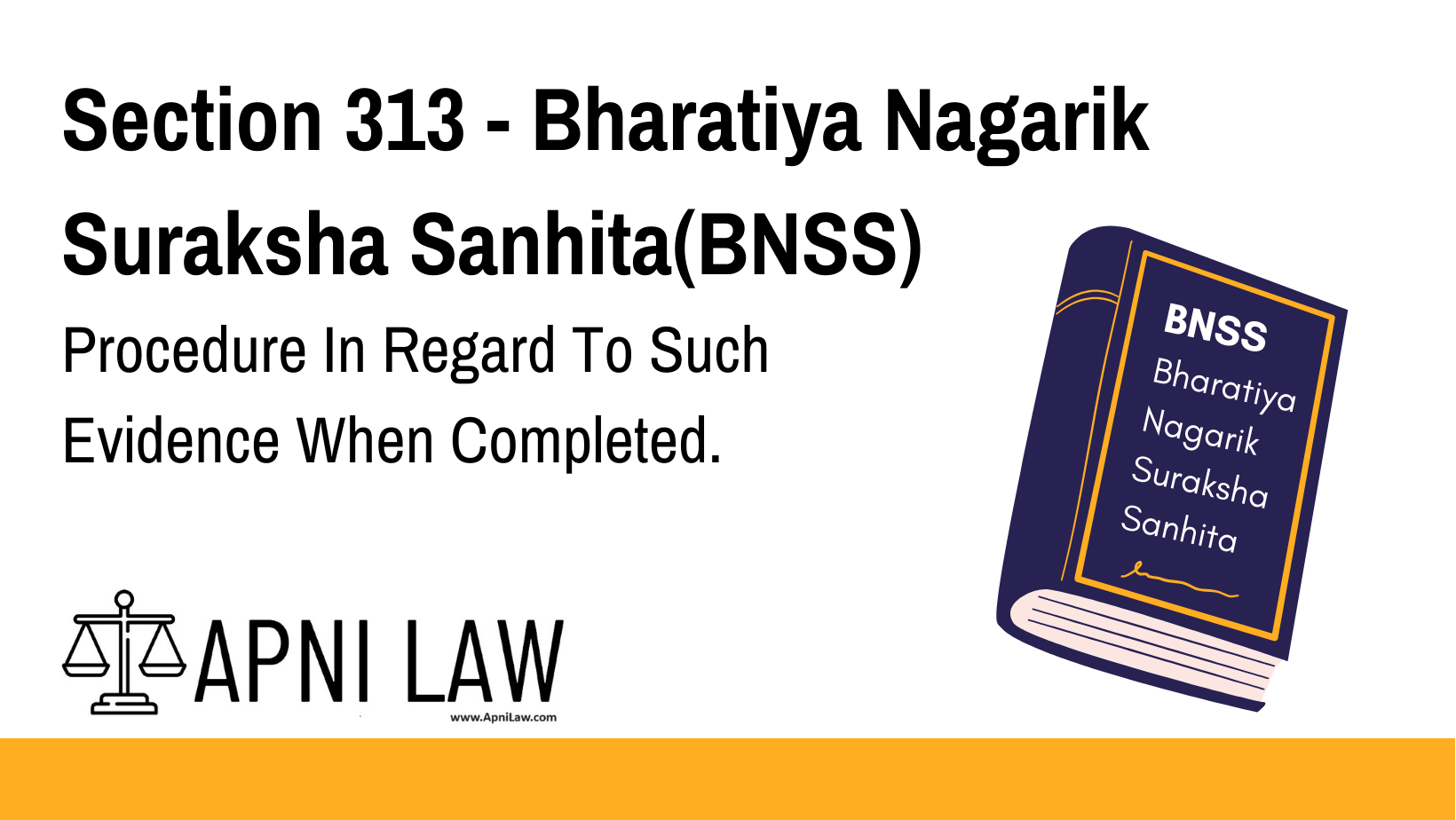Code: Section 313 BNSS
313. (1) As the evidence of each witness taken under Section 310 or Section 311 is completed, it shall be read over to him in the presence of the accused, if in attendance, or of his pleader, if he appears by pleader, and shall, if necessary, be corrected.
(2) If the witness denies the correctness of any part of the evidence when the same is read over to him, the Magistrate or presiding Judge may, instead of correcting the evidence, make a memorandum thereon of the objection made to it by the witness and shall add such remarks as he thinks necessary.
(3) If the record of the evidence is in a language different from that in which it has been given and the witness does not understand that language, the record shall be interpreted to him in the language in which it was given, or in a language which he understands.
Explanation of Section 313 BNSS
Section 313 BNSS sets forth the procedures for reviewing and, if necessary, correcting the evidence of a witness once it has been recorded under Sections 310 or 311. The key elements of this section are:
- Reviewing the Recorded Evidence:
Once a witness’s evidence is recorded, it must be read over to the witness in the presence of the accused (if present) or the accused’s pleader (if the accused appears by pleader). This step ensures that the witness has the opportunity to verify that the record accurately reflects his testimony. - Correction or Memorandum of Objections:
If the witness identifies any inaccuracies when the evidence is read over, the presiding Magistrate or Judge may either correct the evidence or, if a correction is not made, record a memorandum of the witness’s objections. Additionally, the Magistrate or Judge may add any remarks they deem necessary to document the issue. - Language Interpretation:
In cases where the record is in a language that the witness does not understand, it must be interpreted to him in either the language in which the evidence was originally given or in a language he understands. This provision ensures that the witness fully comprehends the record and can raise any objections accurately.
This process not only preserves the integrity of the recorded evidence but also safeguards the rights of the witness and the accused by ensuring that the testimony is accurately documented.
Illustration
Example 1: Correcting a Recorded Testimony
During a trial, a witness’s evidence is recorded by the Magistrate. Once the recording is complete, the evidence is read over to the witness in open Court. The witness notices that a particular response has been recorded inaccurately. The Magistrate, upon noting the objection, corrects the error in the record immediately to ensure that the testimony reflects the true account of the witness.
Example 2: Memorandum of Objections
In another case, when the evidence is read over to the witness, he disagrees with a specific portion of the record but the Magistrate decides not to alter the record. Instead, the Magistrate makes a memorandum noting the witness’s objection and adds remarks detailing the discrepancy. This memorandum becomes part of the official record, providing context for any future review.
Example 3: Interpretation for Language Barrier
A witness gives his testimony in his native language, but the record is maintained in the official language of the Court. Since the witness does not understand the official language, an interpreter is provided, and the recorded testimony is interpreted to him in the language he understands. This ensures that he can verify the accuracy of the record and raise objections if necessary.
Common Questions and Answers on Section 313 BNSS
1. Why is it necessary to read over the evidence to the witness?
- Answer:
Reading over the evidence to the witness ensures that the recorded testimony accurately reflects what the witness stated. It allows the witness to identify and correct any inaccuracies, thereby preserving the integrity of the judicial record.
2. What happens if the witness objects to the recorded evidence?
- Answer:
If the witness objects to any part of the recorded evidence, the presiding Magistrate or Judge may either correct the evidence or, if correction is not made, record a memorandum of the witness’s objection along with any additional remarks deemed necessary.
3. How is a language barrier handled during the review of evidence?
- Answer:
If the recorded evidence is in a language that the witness does not understand, it must be interpreted to him in the language in which it was given or in another language that he understands, ensuring that he can fully comprehend and review the record.
4. Who is present when the evidence is read over to the witness?
- Answer:
The evidence is read over to the witness in the presence of the accused, if he is present, or his pleader if the accused appears by pleader. This presence helps ensure transparency and fairness in the review process.
Conclusion
Section 313 BNSS ensures that the evidence of a witness is accurately recorded and verified by providing a structured process for reviewing and correcting the testimony. By requiring that the evidence be read over to the witness and allowing for corrections or documented objections, this section upholds the integrity of the judicial process. It further safeguards the rights of all parties by ensuring that any language barriers are addressed through appropriate interpretation. For further legal insights and guidance on evidentiary procedures, visit ApniLaw.









